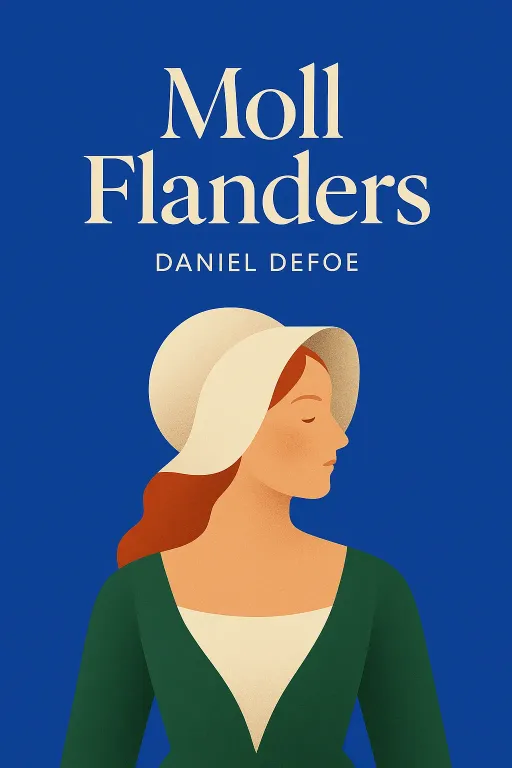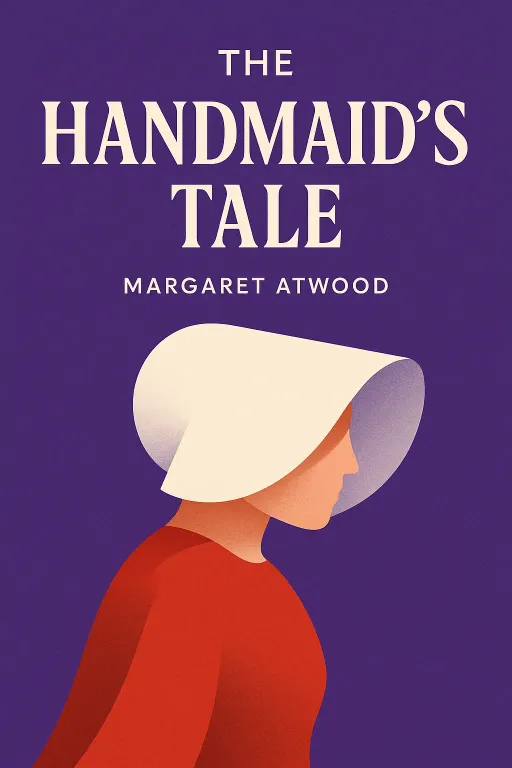
Moll Flanders
9 minIntroduction
Narrator: What if your life began at the absolute bottom? Born in the infamous Newgate Prison to a convicted felon, with no name, no family, and no inheritance in a world where those things meant everything. What choices would you have? Would you accept a life of poverty and servitude, or would you use every tool at your disposal—your wit, your charm, and even your body—to claw your way toward security and status? This is the central conflict at the heart of Daniel Defoe's groundbreaking novel, Moll Flanders. It presents the scandalous, unapologetic memoirs of a woman who becomes a wife, a whore, a thief, and a master of disguise, all in a relentless quest for survival in the harsh landscape of 18th-century England.
Economic Necessity as the Engine of Morality
Key Insight 1
Narrator: In Defoe’s world, morality is a luxury few can afford, especially women. The novel establishes early on that Moll’s life is dictated not by a moral compass, but by economic necessity. Her choices are a direct response to the social and financial constraints placed upon women who lacked the protection of family or fortune. This is powerfully illustrated in her first foray into the world of relationships.
After being raised in the care of the parish, a young and beautiful Moll is taken in as a servant to a wealthy family. She quickly becomes the object of affection for two brothers. The elder brother, a manipulative and wealthy man, seduces Moll with promises of marriage he never intends to keep, making her his mistress. Meanwhile, the younger brother, Robin, develops a genuine love for her and proposes. Trapped between a false promise of status and a true offer of a less-secure love, Moll is manipulated by the elder brother into marrying Robin. The family’s mother, seeing the situation for what it is, offers a dowry to secure the match, effectively buying Moll’s compliance to save the family from scandal. Moll’s marriage to Robin is happy for a time, but it ends in tragedy when his finances collapse and he dies, leaving her a widow with children and no means of support. This formative experience cements a core belief in Moll’s mind: love is fleeting, but financial security is paramount. It sets the stage for a lifetime of decisions where securing wealth, by any means necessary, becomes her primary goal.
The Complex Nature of a Criminal Mind
Key Insight 2
Narrator: As Moll’s circumstances grow more desperate, she descends into a life of crime, becoming one of London’s most skilled and notorious thieves. Yet, Defoe portrays her not as a simple villain, but as a complex and morally ambiguous character. She is both a product of her environment and an active agent in her own downfall, a woman who justifies her crimes as necessary for survival while simultaneously expressing moments of genuine remorse.
Driven to the brink of starvation, Moll’s first theft is an act of impulse. But she soon discovers she has a talent for it. She is mentored by an experienced thief and fence known as "the Governess," who teaches her the tricks of the trade. Moll becomes a master of disguise and deception, pickpocketing, shoplifting, and burgling her way across the city. She takes pride in her skill, boasting that she was "the greatest thief of my time" and managed to evade capture for years while her comrades ended up at the gallows. However, her narrative is punctuated with moments of guilt. She often claims that "the fear of God" was before her eyes even as she committed her wicked deeds. This internal conflict reveals a woman who is not inherently evil but has rationalized her actions to survive. She is a victim of a society that offers her no legitimate path to prosperity, but she is also a willing participant in a criminal enterprise, challenging the reader to judge her actions in the face of overwhelming adversity.
Deception as a Social and Personal Reality
Key Insight 3
Narrator: Throughout her life, Moll Flanders exists in a state of constant flux, adopting new names, identities, and histories to suit her needs. The novel explores how, in a society obsessed with status and appearance, deception becomes a fundamental tool for social mobility. This theme is starkly and shockingly illustrated in one of the most famous episodes of the book: her incestuous marriage.
Seeking stability after a series of failed relationships, Moll travels to Virginia in America, a common destination for those seeking a new start. There, she marries a man she believes to be a wealthy planter, offering her the comfortable life she has always craved. They live together happily for a time and have children. The horrifying truth is revealed during a casual conversation with her mother-in-law. As the older woman recounts her own life story, Moll realizes with dawning horror that this woman is her own mother, who was transported to Virginia as a convict years ago. This means her husband is, in fact, her biological brother. Horrified by the incestuous reality of her marriage, Moll is unable to continue the relationship, despite the financial security it provides. She separates from her husband-brother and returns to England, deeply disturbed. This event underscores the precariousness of identity and the blurred lines between truth and fiction that define Moll’s life. Her entire existence is a performance, but here, the hidden truth of her past erupts with devastating consequences.
The Ambiguous Path to Redemption
Key Insight 4
Narrator: Moll Flanders is framed as a confessional autobiography, written by a woman looking back on her sinful life from a state of repentance. The novel’s conclusion charts a path from crime and punishment to redemption and prosperity, yet the sincerity of this transformation remains one of its most debated aspects. After her long and successful career as a thief, Moll is finally caught, imprisoned in Newgate—the very place she was born—and sentenced to be transported to America.
In prison, facing death, Moll undergoes what appears to be a profound spiritual awakening. She expresses deep remorse for her sins and resolves to lead an honest life. Transported to Virginia with her "Lancashire husband," Jemy (another rogue she married along the way), she applies the same diligence and resourcefulness she once used for crime to honest work. Together, they build a successful plantation, accumulate great wealth, and finally achieve the economic security Moll has pursued her entire life. She eventually returns to England a rich and respectable woman, living out her final days in penitence. While this ending fulfills the conventions of a moral tale, its brevity and the ease of her success can feel perfunctory compared to the decades of thrillingly detailed criminal exploits. It raises a crucial question: Is Moll’s repentance genuine, or is it simply the final, most successful performance of her life, a convenient narrative to justify a life built on vice? The ambiguity leaves the reader to ponder whether true redemption is found in spiritual change or in the ultimate achievement of worldly success.
Conclusion
Narrator: The single most important takeaway from Moll Flanders is its powerful assertion that social and economic conditions are formidable forces in shaping human morality. Daniel Defoe creates a protagonist who is not easily categorized as good or evil, but is instead a pragmatic survivor whose virtues and vices are inextricably linked to her financial circumstances. Her life story is a testament to the idea that when society offers no legitimate path to survival, individuals will create their own, often by breaking the very rules that society holds dear.
Ultimately, the novel challenges us to look beyond simple judgments of right and wrong. It forces us to ask a difficult question: How much of who we are is a product of our own character, and how much is determined by the circumstances into which we are born? Moll Flanders’s journey from the prison cell to the plantation owner’s mansion is a relentless, often immoral, but undeniably human struggle for a place in the world, leaving us to reflect on the true meaning of fortune, repentance, and the resilient, and often desperate, nature of the human spirit.









